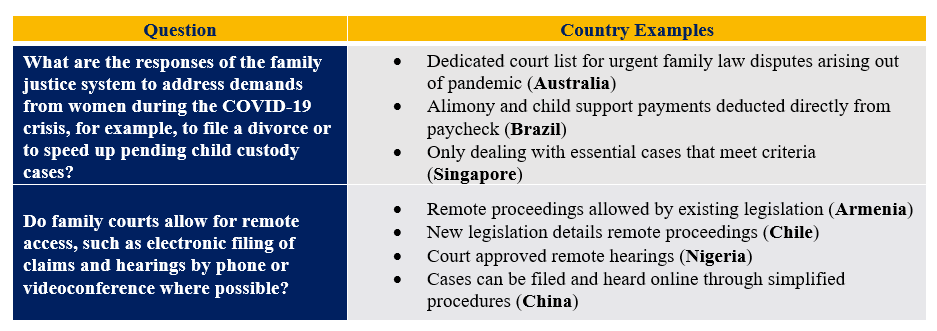 © Allison Kwesell / World Bank
© Allison Kwesell / World Bank
On March 11, 2020, the novel coronavirus was declared a worldwide pandemic. Many things stopped that day: parents started working from home if possible, childcare centers and schools shut down, bars and restaurants closed, and even parks and museums ceased operations. But for many families, the challenges they faced at home remained. The COVID-19 crisis may have even exacerbated them. Domestic violence, for instance, has increased globally during lockdown.
How can families navigate issues like child custody, divorce, or domestic violence amid current restrictions? Women, Business and the Law set out to answer this question as part of the launch of our yearly data collection efforts in May. Women, Business and the Law presents an annual index of gender equality in the law in 190 economies. Data are collected through survey responses from local legal experts, with a final dataset that identifies barriers to women’s economic participation and encourages the reform of discriminatory laws.
Worldwide, women initiate the majority of family law cases. Custody arrangements, financial obligations such as alimony, and court closures amid stay-at-home orders could disproportionately affect them. In such cases, justice systems might consider implementing novel methods of serving their constituents while maintaining safety as a priority. For these reasons, we designed new survey questions to collect additional data on the measures that governments are implementing to address the challenges women face during this time.
Already, some interesting data have come out of this research, as countries have employed different measures to ensure access to family court. Australia, for example, established a court list dedicated exclusively to dealing with urgent family law disputes that have arisen as a result of COVID-19. In Brazil, decisions regarding child support and alimony can now be sent directly to the provider’s place of work and electronically deducted from their salary. In Dominican Republic, Singapore, and Sri Lanka, family courts will deal only with essential and urgent cases during lockdown. To determine what is essential and urgent, they consider three factors: 1) time sensitivities; 2) threats to life and liberty; and 3) urgent needs of the family.
With regard to remote access, such as electronic filing of claims or hearings by videoconference, responses are similarly varied. Some civil codes were already equipped for such a situation. In Armenia, for instance, Art. 100 of the Civil Code states that “at the reasoned request of a participant in the trial, the court allows him or another participant in the trial to participate in the court session using audio-visual means of telecommunications.” Similarly, the law in Ghana allows for evidence to be given via videoconference.
Figure 1. Women, Business and the Law data collection on family court COVID-19 measures
Other countries passed specific orders to deal with the pandemic. India, Pakistan, and South Africa rapidly introduced virtual courts to resolve urgent matters. The state judiciary in Nigeria approved Skype or Zoom hearings on May 4. In Chile, Act No. 53 of 2020 declared that “a state of emergency cannot constitute an obstacle to the right of access to justice” before detailing remote access and electronic filing guidelines.
In many places, it may be a long time before courts will be able to open and operate as normal. These examples are encouraging, as they signal that women’s security and agency remain a priority even in times of crisis. However, for countries without the infrastructure or resources to implement such systems, it may prove difficult for women to continue going to court. In some countries, for example, courts completely closed during the pandemic, only recently reopening for urgent matters. In others, no specific measures have been taken by the family justice system.
Women, Business and the Law will provide more insight into new approaches countries have been implementing to serve their constituents in its next edition, which will be released in February 2021. We are hopeful that as countries adapt to the pandemic, they can continue to innovate solutions to allow women to access justice. By strengthening the rule of law and narrowing inequality, access to family courts is a fundamental component of sustainable economic growth. If comprehensive, it can give women the ability to advocate for their interests and ensure enforcement of the law, even and especially in difficult times.



Join the Conversation